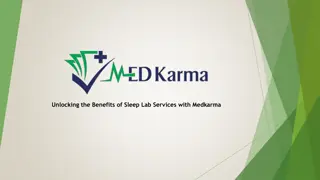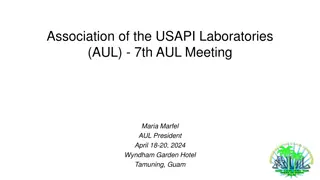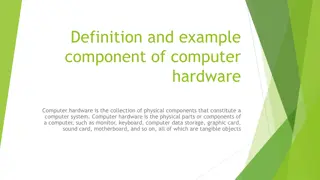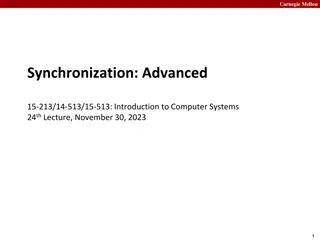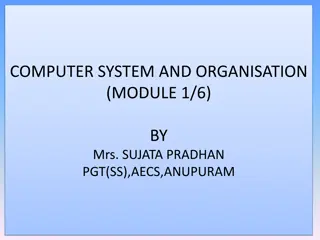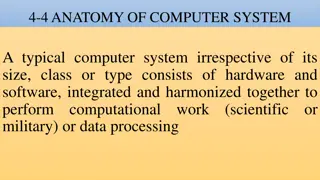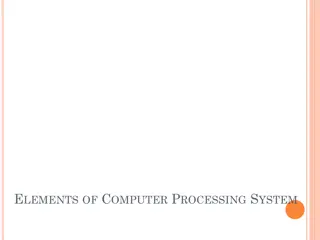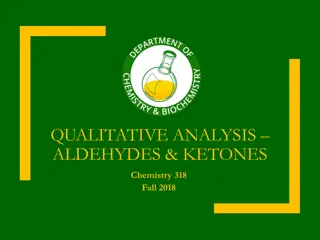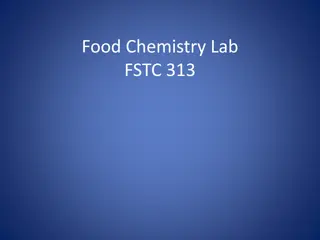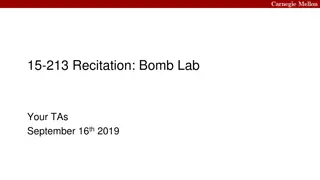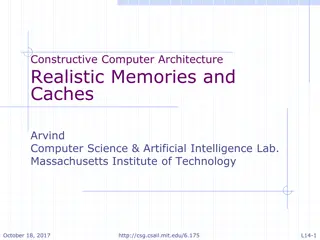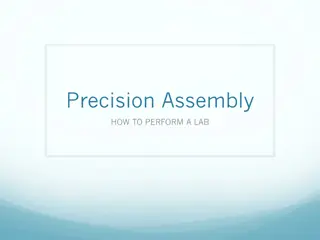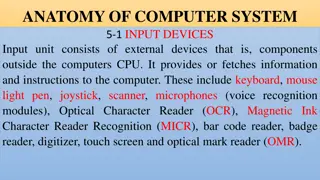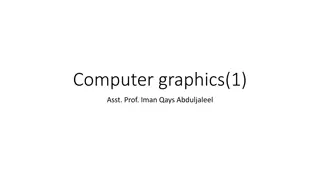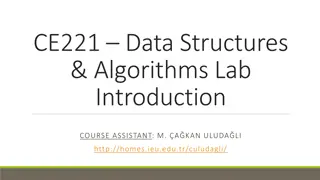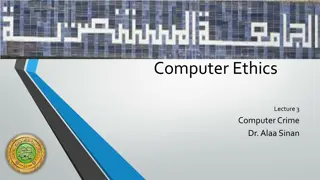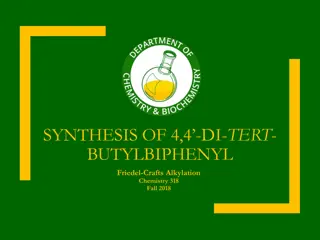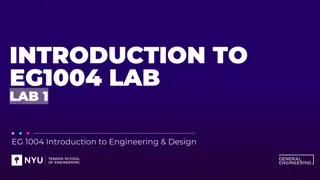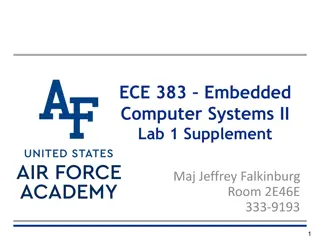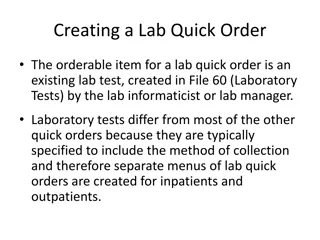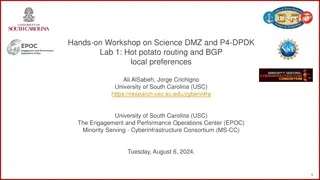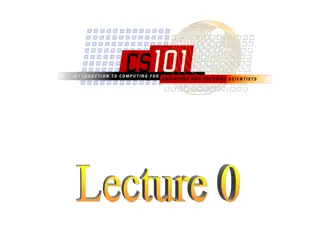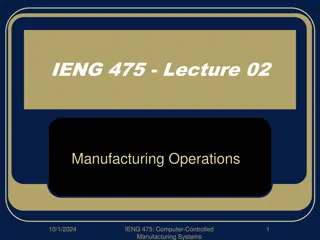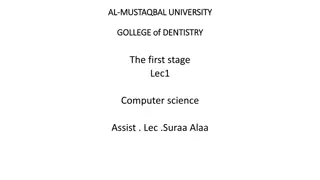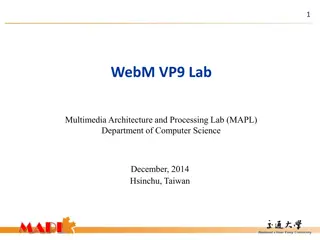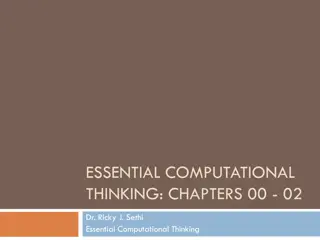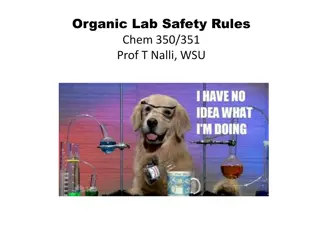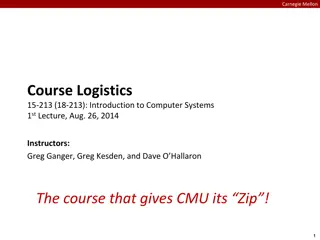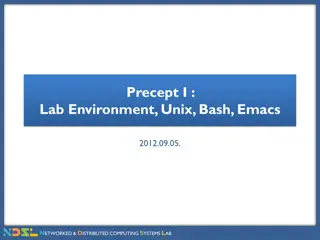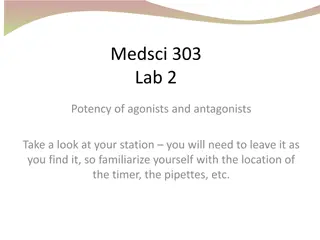Understanding Computer Organization and Architecture
A computer system is a programmable digital electronics device that processes data as per program instructions to provide meaningful output. It comprises hardware and software components, with hardware being the physical parts and software essential for driving the hardware. Computer organization fo
14 views • 71 slides
Comprehensive Overview of ABE Lab Manual and Foundations of Biotech Package
The ABE Lab Manual, authored by Doreen Osgood, MS, PhD, is a comprehensive resource for biotechnology education, including sequences like Genetic Engineering and Colony PCR. The manual includes teacher and student guides, along with related resources like PowerPoint presentations and lists of labora
1 views • 5 slides
Exploring the Reasons Behind Cannabis Lab Testing
Cannabis lab testing has become an integral aspect of the cannabis industry, ensuring that consumers have access to safe, high-quality products. In this comprehensive guide, weu2019ll explore the reasons behind cannabis lab testing and why itu2019s crucial for both consumers and producers alike.\n\n
12 views • 1 slides
Unlocking the Benefits of Sleep Lab Services with Medkarma
In today's fast-paced world, quality sleep is more important than ever. Sleep disorders, which can significantly impact overall health and well-being, are on the rise. This is where sleep lab services come into play. Medkarma, a leading name in the healthcare industry, offers top-notch sleep lab ser
1 views • 7 slides
Association of the USAPI Laboratories (AUL) Overview
The Association of the USAPI Laboratories (AUL) was established to strengthen lab networks in the USAPI countries, promote excellence in laboratory services, serve as a resource for USAPI laboratories, and impact health planning through lab-based surveillance. Key initiatives include adopting lab st
1 views • 14 slides
Overview of Computer Hardware Components and Software Functions
Computer hardware components such as monitor, CPU, mouse, and projector are essential physical parts of a computer system, while software includes intangible programs like operating systems and utility software. Hardware components perform tasks like displaying data, processing information, and prin
8 views • 9 slides
Carnegie Mellon Synchronization and Computer Systems Lecture Updates
Carnegie Mellon's recent announcements include lab checkpoints and finals deadlines, as well as the release of an optional lab extension for the Shark File System. The lecture topics cover races, mutual exclusion, deadlock, semaphores, events, queues, reader-writer locks, starvation, and thread-safe
0 views • 43 slides
Understanding Computer Architecture and Organization
Computer architecture and organization are fundamental aspects of computing systems. Computer architecture focuses on the functional design and implementation of various computer parts, while computer organization deals with how operational attributes come together to realize the architectural speci
3 views • 40 slides
Understanding Computer System and Organization
Computer Organization involves the logical structure of a computer, defining the interconnections of components for optimal performance. Computers process data through an Input-Process-Output cycle, with input, processing, and output units working together. The characteristics of a computer include
1 views • 20 slides
Computer Science Department Information and Courses Offered
The Computer Science Department provides information on courses offered for GCSE or BTEC qualifications, specifically focusing on the AQA GCSE in Computer Science. The course equips students with valuable thinking and programming skills essential in the modern workplace, covering key concepts and pr
3 views • 7 slides
Anatomy of a Computer System: Hardware Components and Functions
A typical computer system consists of hardware and software working together to perform various computational tasks. The hardware components include the central processing unit (CPU), input/output devices, storage units, and the motherboard. The CPU acts as the main brain of the computer, performing
6 views • 6 slides
Understanding Computer Processing Systems
Computer processing systems consist of various components such as the control unit, ALU, input unit, CPU, output unit, memory, and more. Input devices feed raw data to the computer, while output devices provide processed information. The CPU plays a crucial role in executing instructions and data pr
0 views • 13 slides
Qualitative Analysis of Aldehydes and Ketones in Chemistry Lab
In this Chemistry 318 lab, students will conduct qualitative analysis of aldehydes and ketones using chemical and spectroscopic methods. The lab includes classification tests, spectroscopy (IR, 1H-NMR/13C-NMR, MS), and identification of unknown compounds. Experimental procedures involve physical eva
1 views • 11 slides
**Exploring Inquiry-Based Learning in Computer Science Education**
Inquiry-based learning (IBL) in computer science classrooms focuses on fostering communication, collaboration, decision-making, and problem-solving skills among students. The approach involves students constructing knowledge through independent, active activities based on real-world experiences. How
0 views • 18 slides
Food Chemistry Lab FSTC 313 Rules and Regulations
In the Food Chemistry Lab FSTC 313, students are expected to adhere to strict guidelines regarding attendance, lab safety, late policies, missed lab policies, and technical abstract requirements. The lab emphasizes group work, application notes for the food industry, and individual abstract writing
5 views • 24 slides
Opportunities for Undergraduates in Health Research Lab
The Mohan Research Lab offers undergraduates the chance to conduct impactful research that can be published, focusing on biomarkers and targets for autoimmune diseases and cancers. Led by an international team of researchers, the lab provides a collaborative environment for students to engage in cut
4 views • 12 slides
Evolution of Algorithms and Computer Science Through History
The history of algorithms and algorithmic thinking dates back to ancient times, with the development of general-purpose computational machines by Charles Babbage in the 19th century marking a significant advancement. The term "computer science" emerged in 1959, encompassing theoretical computer scie
1 views • 39 slides
15-213 Recitation: Bomb Lab Overview and Tips
This content covers the Bomb Lab exercise in x86-64 assembly code and GDB debugging techniques. It explains the purpose of Bomb Lab, downloading the bomb, detonating the bomb, hints for solving phases, and x86-64 Linux register usage. The material emphasizes the importance of using GDB for efficient
1 views • 42 slides
Constructive Computer Architecture Realistic Memories and Caches
Explore the realm of constructive computer architecture, realistic memories, and cache systems as presented by the Computer Science & Artificial Intelligence Lab at Massachusetts Institute of Technology. Delve into topics like 2-stage pipeline, magic memory models, and memory system views to gain in
0 views • 20 slides
Precision Assembly Lab Guidelines
This guide provides step-by-step instructions on how to perform a precision assembly lab effectively. From understanding lab assignments to seeking assistance and proper documentation, this resource covers key aspects to ensure a successful lab experience. Following these instructions will help you
2 views • 11 slides
Overview of Computer Input and Output Devices
Input devices of a computer system consist of external components like keyboard, mouse, light pen, joystick, scanner, microphone, and more, that provide information and instructions to the computer. On the other hand, output devices transfer information from the computer's CPU to the user through de
0 views • 11 slides
Clemson ECE Laboratories - Electronics Lab Information
Explore pre-labs for ECE 311 Electronics Lab I, created by Steven Chambers in Fall 2012 at Clemson University. The labs cover topics like curve tracer plots for diodes and transistors, background on Bipolar Junction Transistors (BJTs), instructor and lab coordinator contact information, mandatory sa
0 views • 69 slides
Understanding Computer Graphics: An Overview
Computer graphics involves creating images and animations using a computer through hardware and software systems. It has evolved significantly over the years, with advancements in generating various types of computer graphics. Learn about the basics of computer graphics, including digital image repr
0 views • 15 slides
Introduction to CE221 Data Structures & Algorithms Lab with Assistant M. A. Kan Uludağlı
CE221 Data Structures & Algorithms Lab offers opportunities to work on solving selected book questions, quizzes, multiple lab exercises, and coding assignments under the guidance of Assistant M. A. Kan Uludağlı. The assignments will be completed in the lab environment, focusing on Java coding assi
0 views • 7 slides
Understanding Computer Crimes and Prevention Strategies
Computer crimes involve illegal acts utilizing computer systems, leading to various consequences. This lecture covers the types of computer system attacks, motives behind computer crimes, costs, prevention strategies, and reflection on the discussed topics. It emphasizes the increasing scope of comp
1 views • 20 slides
Organic Chemistry Synthesis Lab Overview for Fall 2018
The post provides detailed information on the synthesis of 4,4-di-tert-butylbiphenyl through Friedel-Crafts Alkylation in Chemistry 318 for the Fall 2018 semester. It includes a schedule of the lab day, due dates for reports and assignments, grading criteria, pre-lab requirements, and emphasis on si
1 views • 15 slides
Introduction to EG1004 Lab - Engineering & Design Overview
Introductions, lab format, absence and tardy policies, student expectations, course resources, makeup lab policies, and website registration details for EG1004 Introduction to Engineering & Design lab. Learn about lab group formats, quiz procedures, policies on late arrivals and absences, student re
1 views • 10 slides
Embedded Computer Systems Lab 1: VGA Module Overview
This document provides an overview of Lab 1 for Embedded Computer Systems II, focusing on the VGA module and its functionalities. It includes details about the VGA module entity, its ports, clock signals, trigger voltage and time representation, channel signals, color intensities, row and column val
0 views • 18 slides
Managing Lab Quick Orders for Efficient Testing Workflow
Lab quick orders for existing lab tests in an EHR system are crucial for efficient testing workflows. Different menus are created for inpatients and outpatients, specifying collection methods and instructions. This comprehensive guide covers the process of creating lab quick orders, including exampl
0 views • 10 slides
Hands-On Workshop on Science DMZ and P4-DPDK Lab
Join the workshop at the University of South Carolina to learn about hot potato routing, BGP local preferences, and hands-on lab activities focusing on network topologies and configurations. Explore the Lab Topology, Lab Configuration, and Platform Information for an interactive learning experience
0 views • 6 slides
CS101 Course Overview and Lab Information
CS101 is a foundational course covering Engineering CAD/Prototyping tools, MATLAB, Unix/Linux, software design, and C programming. The course involves attending lectures, group software projects, quizzes, programming assignments, midterm exams, and regular study of lecture notes. Lab activities are
0 views • 23 slides
Computer-Controlled Manufacturing Systems Overview
This document outlines the schedule and details for the IENG 475 course on Computer-Controlled Manufacturing Systems. It includes lab schedules, team assignments, lab procedures, and project documentation guidelines. Students are required to attend labs on time, complete assignments, and maintain a
0 views • 19 slides
Overview of Computer Science at Al Mustaqbal University College of Dentistry
Al Mustaqbal University College of Dentistry offers courses in computer science, covering topics like data reception, processing, storage, and output. The curriculum includes the study of computers as electronic devices, data and information, computer features, operating systems like Windows, and ta
0 views • 10 slides
WebM VP9 Multimedia Architecture Lab Overview
Explore the WebM VP9 Lab at the department of Computer Science, Hsinchu, Taiwan in December 2014. The lab focuses on multimedia architecture and processing, showcasing software demonstrations, test conditions, coding results, and performance comparisons. Discover the software repository links, Cygwi
0 views • 35 slides
Understanding the Essence of Computer Science and Computational Thinking
Delve into the fundamentals of Computer Science and Computational Thinking through chapters discussing the nature of science, predictions in physics, and the distinction between Computer Science and Computer Information Systems. Explore the relationships between Math, Physics, and Computer Science i
0 views • 29 slides
Organic Lab Safety Rules - Chem 350/351
Chemical safety is paramount in the organic lab. Always wear splash-proof goggles, report injuries promptly, and know the locations of safety equipment. Submit pre-lab plans, work in fume hoods, wear gloves as instructed, and follow lab schedules. Unauthorized experiments and food/drink are prohibit
0 views • 35 slides
Carnegie Mellon Course Logistics: Introduction to Computer Systems
Carnegie Mellon University offers the course 15-213: Introduction to Computer Systems, taught by instructors Greg Ganger, Greg Kesden, and Dave O. Hallaron. The course covers essential topics in computer systems and programming, emphasizing practical skills through lectures, labs, and exams. Recomme
0 views • 23 slides
Networking and Distributed Computing Systems Lab Setup Guide
Set up your lab environment for networking and distributed computing systems using Unix, Bash, and Emacs. Learn to access lab machines via SSH, use PuTTY and Terminal for communication, simulate Linux environment on Windows with Cygwin, run different OS on VMware Player, download and install Linux o
0 views • 14 slides
Pharmacology Lab Equipment and Safety Guidelines
Explore the setup and procedures of a Pharmacology lab focusing on agonists and antagonists potency testing. Learn about equipment, tissue suspension, lab safety, lab plan, and health precautions. Follow instructions for conducting experiments, recording data, and cleaning up. Utilize resources prov
0 views • 28 slides
Lab Safety
Lab Safety. Professor Lei Zhu\u2019s Research Group 2013.10.09. Outlines. Lab Safety Training Eye Protection Lab Coat Gloves Fume Hoods CHP, ECP Emergency. 1. Lab Safety Training. You can work in the lab only after you finish the lab
6 views • 10 slides



